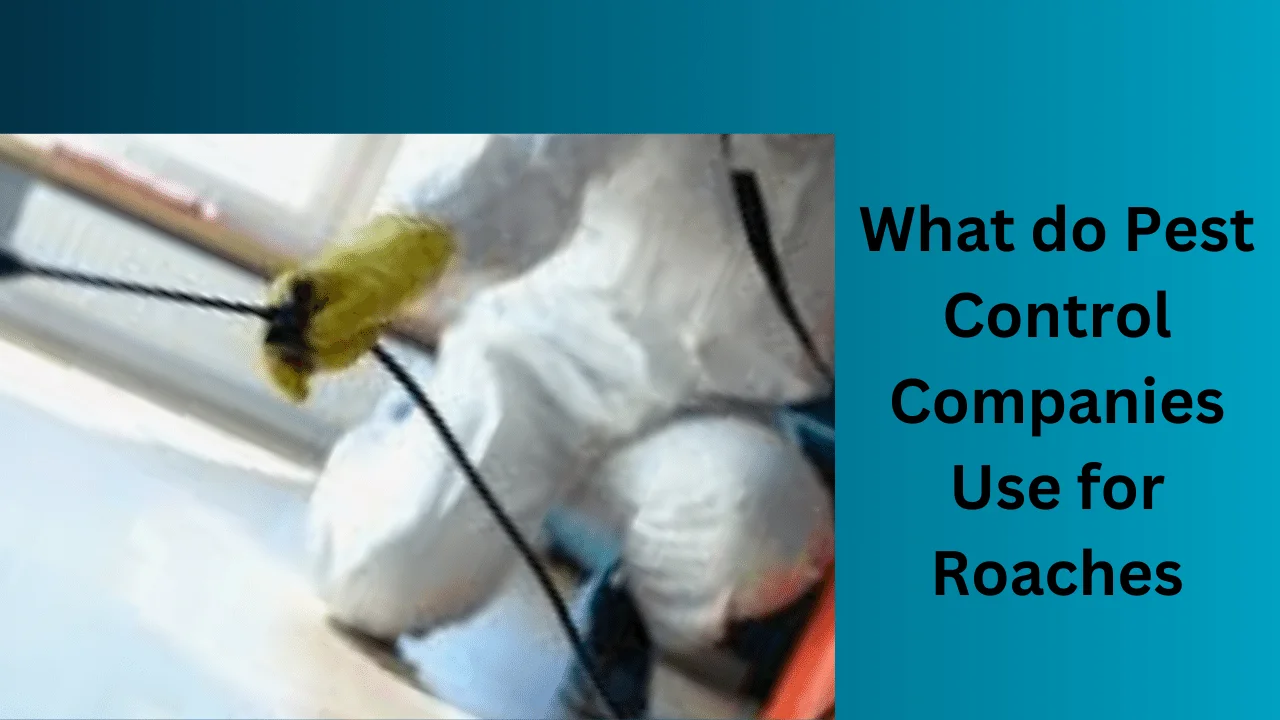The pest control industry is at the forefront of the fight against roach infestations, using a wide variety of cutting-edge tools and techniques. Effective pest control solutions are crucial because just thinking about roaches can make people feel anxious and uneasy. What do pest control companies use for roaches? They utilize a mix of chemical treatments, baits, growth regulators, and physical removal methods. These approaches are designed to not only kill roaches but also to prevent future infestations by disrupting their life cycle and making the environment inhospitable for them. The resiliency of these creatures belies the dangers they pose to humans and property. Therefore, homeowners who want to live in peace and avoid roaches should familiarize themselves with the techniques used by pest control experts to eliminate these pests. For those looking for effective solutions, learning how to get rid of cockroaches in Florida can help homeowners take the necessary steps to prevent infestations.
Who Requires Roach Pest Control Services?
The possibility of a roach infestation is real for almost any type of building, whether residential or commercial. As long as these pests have access to food, water, and shelter, they won’t be fussy about where they live. Roach colonies can be established in any environment that provides an ideal environment, be it a spotless home or a busy restaurant kitchen. As a result, roach pest control services are crucial for preserving health and cleanliness, shielding homes and businesses from the damage that infestations can cause.
Strategies for Roach Eradication
In order to eradicate roaches effectively and comprehensively, pest control companies use a multi-pronged strategy that includes both chemical and non-chemical treatments.
Chemical Treatments for Roaches
Insecticides, especially chemical treatments, are still the backbone of roach control methods.
Use of Pyrethrins and Pyrethroids
Because of their rapid knockdown effect on roaches, pyrethroids—both synthetic and derived from chrysanthemum flowers—are extensively used. They cause paralysis and death by interfering with these pests’ neurological systems. Those who work in pest control frequently apply these chemicals to roach hotspots.
Neonicotinoid Insecticides
Another strong chemical weapon against roaches is neonicotinoids, which block the neuronal nicotinic acetylcholine receptors. Because they keep working even after the initial application, these insecticides are highly prized for preventing re-infestation.
Insect Growth Regulators
Insect growth regulators (IGRs) stop roaches from maturing and reproducing by targeting their developmental stages. Intervening gas roosters (IGRs) provide a sustainable pest management strategy by disrupting the roach life cycle; they are most effective when applied in combination with other pesticides.
Baiting Methods
The use of attractants combined with pesticides is known as baiting, and it is a strategic approach. Roaches consume the poisonous chemicals after being attracted to the bait. The ability to return the insecticide to the colony makes this a very effective method for getting rid of infestations at their source.
Non-Chemical Roach Control Methods
When it comes to roach infestations, pest control companies use both chemical and non-chemical methods.
Sanitation Measures
Preventing roach infestations requires proper sanitation. Eliminating roach-attracting food and water sources and sealing entry points are common pieces of advice given by pest control experts.
Trapping Devices
To keep an eye on and control roach populations, traps can be a useful tool. For instance, roaches can be captured chemical-free by setting up sticky traps in suspected roach habitats.
Physical Barriers
Fixing screens, sealing holes, and making sure windows and doors fit snugly are all ways to construct physical barriers. The likelihood of roaches entering a property can be greatly diminished by implementing these measures.
Safety and Environmental Considerations
When it comes to pest control, customer and environmental safety are of the utmost importance. Current methods of pest control place an emphasis on chemical prudence, with a focus on roach-killing products that cause the least amount of harm to people, pets, and other non-target animals. Furthermore, as part of a larger effort to preserve the environment and promote sustainability, the industry is always looking for new, creative ways to deal with pest issues.
Evaluating the Effectiveness of Insect Growth Regulators
An innovative method for controlling roach populations has emerged with the advent of Insect Growth Regulators (IGRs). Insect growth regulators (IGRs) are a novel approach to long-term roach control because they impede the development and growth of insects.
Mechanism of Action
IGRs work by simulating the hormones that control the development and growth of roaches. Because immature roaches are unable to reproduce due to IGRs’ disruption of these hormonal signals, the population of roaches is gradually reduced.
Advantages of IGRs
One major advantage of using IGRs is that they are targeted, so they don’t hurt non-target species as much. This includes people and pets. Also, integrated pest management solutions are environmentally friendly because they stop future generations of roaches from being born by attacking their reproductive cycle.
Application Methods
Pest control experts can choose the most effective method of applying IGRs depending on the specific infestation scenario. These methods include sprays, baits, and foggers, among others. Roach breeding and hiding places can be inaccessible, so this adaptability is essential.
Integration with Other Pest Control Strategies
It is common practice to use IGRs in conjunction with other pest control strategies for the best results. To effectively control roaches, both in the short term and in the long run, it is best to use a combination of chemical and non-chemical methods.
Innovative Pest Control Technologies
New technology are constantly appearing in the pest control industry, and they are helping to solve the problems of roach eradication in ways that are less harmful to the environment and more effective.
Heat Treatment
The goal of heat treatment is to kill roaches without harming people or pets by increasing the temperature of the affected area to a point where they can’t survive. For commercial properties with widespread infestations, this method works wonders.
Cold Treatment
On the other hand, roaches can be electrocuted or frozen to death using cold treatment. To reduce the likelihood of chemical exposure, this method is commonly employed for items that can be extracted from the affected area and treated independently.
Ultrasonic Devices
The high-frequency sound waves emitted by ultrasonic pest repellers are intolerable to roaches and other pests, so they flee from the treated area. Ultrasonic devices provide an alternative to chemical-based pest control that is both non-toxic and has varying degrees of effectiveness.
Long-Term Roach Control and Prevention
In order to keep a space free of roaches, it’s not enough to simply get rid of the ones that are already there; continuous preventative measures are required.
Regular Inspections
Professional pest inspectors should check for signs of infestation on a regular basis; this way, they can take preventative actions before problems even start.
Sealing Entry Points
If you want to keep roaches out of your house, you need to seal all the holes and cracks in the walls, floors, and foundation. When coupled with other pest control strategies, this measure becomes even more effective.
Ongoing Sanitation and Maintenance
Reducing the attractants that can lead to a roach infestation requires a persistent focus on sanitation, which includes appropriate food storage and waste management. A long-term plan for pest control must include regular cleaning and maintenance.
FAQs
What attracts roaches to homes?
Roaches are attracted to food, water, and shelter. Poor sanitation and the presence of clutter can make homes more inviting to these pests.
Are roach baits safe to use around pets and children?
Most roach baits are designed to be safe around pets and children, but it’s important to follow the product instructions and place them out of reach.
How long does it take to see results from a professional roach treatment?
Results can vary, but it’s common to see a significant reduction in roach activity within a week or two of treatment.
Can roaches become resistant to pesticides?
Yes, roaches can develop resistance to pesticides over time. This is why pest control companies often use a combination of methods and periodically rotate products.
Is it possible to completely eliminate a roach infestation?
With professional pest control services and proper prevention measures, it is possible to effectively eliminate a roach infestation and prevent future occurrences.
Conclusion
Combating roaches is an intricate process that calls for knowledge, accuracy, and preparation. Pest control services have the expertise and equipment to deal with even the most difficult infestations, ensuring victims can rest easy. What do Pest Control Companies Use for Roaches? Roach control teaches people about the ins and outs of pest management and why it’s important to call in the pros when they see a problem. With a comprehensive approach that often includes the use of specialized insecticides, baits, and traps, alongside preventive measures to block future infestations, an environment free of roaches is not only possible, but guaranteed.

Shannon Reyes is a seasoned writer with a knack for crafting engaging blogs on a variety of service industries, including plumbing, cleansing, moving, pest control, and roofing. With a keen eye for detail and a passion for helping readers navigate complex topics, Shannon brings her expertise to life through informative and accessible content.












Thanks for sharing. I read many of your blog posts, cool, your blog is very good.
Your article helped me a lot, is there any more related content? Thanks! https://accounts.binance.info/da-DK/register?ref=V3MG69RO